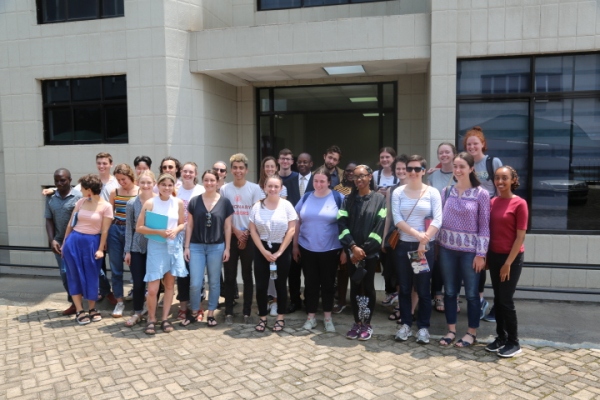
Kigali: Today 5th March 2020, 25 undergraduate students from the United States, who are part of the School for International Training (SIT) Study Abroad Program, along with their academic director, visited the National Commission for the Fight against Genocide (CNLG).
The students are attending a semester abroad program based in Rwanda under the framework of “Rwanda: Post-Genocide Restoration and Peacebuilding” and were interested to learn about CNLG’s work related to the preservation of the memory of the Genocide against the Tutsi and the fight against its ideology.
Today’s speaker was Dr Jean-Damascène Gasanabo, Director General of the Research and Documentation Centre on Genocide at CNLG. The presentation, delivered by Dr. Jean-Damascene Gasanabo, began with an introduction of CNLG’s goals, values and activities, related to commemoration, prevention, advocacy, research and documentation of the Genocide against the Tutsi in Rwanda. This year marks the 26th Commemoration of the Genocide against the Tutsi and the students were able to learn more about Kwibuka and how it contributes to healing, reconciliation and the rebuilding of society after genocide. Further, they learned more about the importance of education among both adults and youth in the prevention of future atrocities, both in Rwanda and globally.
The students gained deeper insight into the Genocide against the Tutsi, learning about the historical context prior to the genocide including the pre-colonial, colonial era and years leading up to 1994. Furthermore the delegation discussed how Rwanda has recovered in the wake of the genocide including post-genocide mechanisms of justice, reconciliation and development.
He also explored the ongoing threat of genocide ideology and genocide denial both in Rwandan society and abroad. He introduced specific evidence of cases of genocide ideology and denial that occurred in 2018 during the commemoration period and how they were dealt with by the laws. He highlighted the dangers of such speech in regards to re-traumatization of victims and its role in inciting genocide.
Prevention and education were also of great interest to the students and one asked about how the government is fighting genocide ideology. Dr Gasanabo then explained how genocide ideology is recognize and how it is punished by the laws and gave examples of Rwandans who have been tried and convicted for this crime. He also shared with them the recent development in prosecution of genocide perpetrators abroad.
Dr Gasanabo explained some of the measures set in place to fight genocide ideology, denial and trivialization of the Genocide against the Tutsi, including Genocide memorials sites which show the magnitude of the Genocide, law, constant advocacy for survivors, education for all Rwandans to bear witness to what happened here.
Dr Gasanabo’s presentation subsequently delved into the International Criminal Tribunal for Rwanda (ICTR) and Gacaca. He explained to the students the reason there were so many cases brought before Gacaca Courts. If someone was accused of committing genocide, rape, or property-related crimes in more than one place they would be tried in multiple Gacaca Courts.
CNLG is also responsible for the preservation of genocide document and the bodies of genocide victims. Dr. Gasanabo discussed an ongoing preservation project at Murambi in partnership with the University of Hamburg and the Hannover Museum of Cultural Heritage, in which 20 bodies (11 adults and 9 children) are undergoing a process to ensure that they remain in good condition. He talked about the preservation of textiles at Nyamata, in collaboration with the University of Pennsylvania.
Dr Gasanabo informed the students that CNLG has also applied to gain UNESCO World Heritage status for the genocide memorials in Kigali, Murambi, Nyamata, and Bisesero.
The presentation concluded with Rwanda’s aspirations for the future, guided by Vision2020, Vision2050 and the National Strategy for Transformation. (End)
